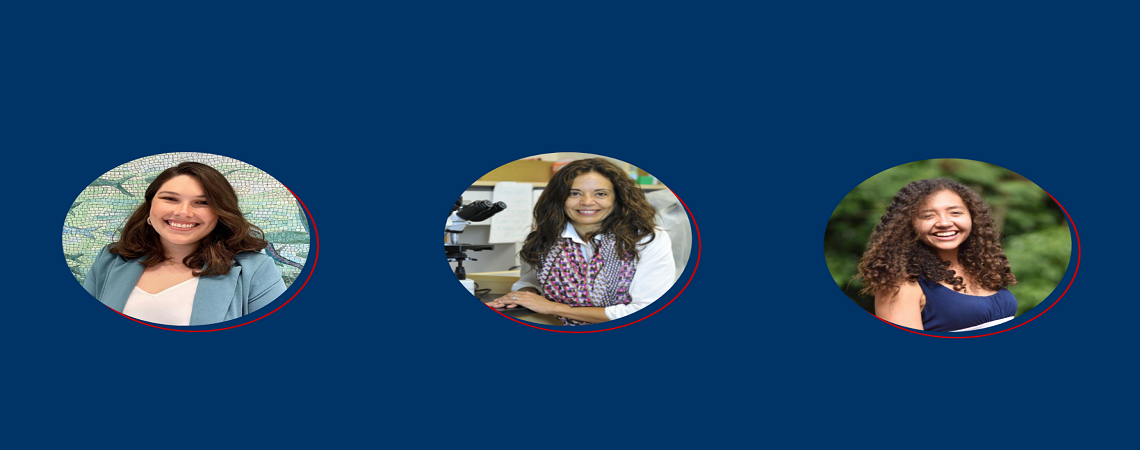
Written by: Cheyanne Durham . April 22, 2022
The words woman and female are used in this article, but this discussion's topic is inclusive of all genders, identities, and minority groups. The FAU Marine Lab is committed to diversity and inclusion.
Last month, the FAU Marine Lab had the honor of hosting a panel conversation between students and three amazing women in STEM.
Dr. Evelyn Frazier, PhD - university instructor, undergraduate mentor, mother
Dr. Lauren Simonitis, PhD - neurobiologist, croqueta de jamón connoisseur, theatre nerd
Dr. Delia Shelton, PhD - driven scientist, global community member, advocate
Looking at their careers now, the obstacles discussed during our session are not immediately apparent. Prominent during our conversation was the idea that women and minorities are pushed out of academia; a concept referred to as the leaky pipeline.
“Every time I’ve moved up [in academia] there are less and less women,” said Dr. Simonitis. “I personally think it is a forcefully pushed out pipeline of all these systemic things… that are actively pushing people out as they advance to the next career stage. I know multiple people that dropped out of academia because of family… They were told they had to choose.”
And this is not uncommon. As this problem persists in academia, young women encouraged to pursue careers in the sciences become quickly disenfranchised. Lack of diversity plays an important role, Dr. Shelton pointed out.
Dr. Shelton highlighted how the diversity of the community was important for her career decisions: “I grew up in a diverse community with other black people around me. During my job search, my consideration was am I going to be able to be the full me? To be able to realize my personal goals?...I wasn’t willing to sacrifice that. It is important to have that discussion, can you do your best science when those other parts of you aren’t fulfilled?”
Representation allows aspiring scientists to find role models with not only similar career paths, but a similar lived experience. Dr. Frazier focuses heavily on her mentorship for undergraduate students. She personally understands the importance of this, because she has experienced much of her higher education without female mentors.
“My female role models were in high school; I had female teachers who were very competent. Again in the university there was one female who was extremely competent and positive, but everyone else was a man… Students come to me sometimes and say ‘It is so good to see a female who is so into her research and so interested in biology.’ The students notice and it makes a big difference when we do have female role models.” Dr. Frazier shared.
“I love bringing on people to work with me who [tell me] ‘I haven’t worked with another woman before’ or ‘I haven’t worked with a latina before - this is so new and so different! I’ve never had this.’ Whenever my students tell me that, I feel so rewarded and happy… That has been the one of the most inspiring parts of being a woman and a latina in science, whenever I can help build that community and bring people up with me.” Dr. Simonitis added.
Role models and representation are extremely powerful, but systemic barriers may require larger solutions. Policy changes, administrative changes, and last - but certainly not least - allyship across genders, races, and communities.
“The changes that are coming are coming so slowly in academia…” Dr. Frazier said. “When it comes to academia, we are like this big mountain that doesn’t want to move. We are at the point where we need some serious policy changes coming from the top - to encourage women to be in science, and encourage women to stay in science.”
Change comes through the support and advocacy of everyone, not only scientists like our panelists.
“The only way we are going to make changes is if there is a critical mass of women, gender minorities, and allys making this movement to fight for these things,” Dr. Simonitis added.
Dr. Shelton closed off our panel event by saying, “Be supportive in any way that you can. It doesn’t take anything from you to uplift someone else.”
We are incredibly thankful to our panelists for sharing their knowledge and experience with us as we continue to grow as a lab, university, and community. Diversity of thought is a catalyst for innovation; progress in STEM is undermined when it is lost. At the FAU Marine lab, our commitment to equity has been invaluable to our research.
Learn more about our panelists and the resources they shared with us below:
Dr. Frazier and the Terrestrial Ecology Lab
Every Other Thursday: Stories and Strategies from Successful Women Scientists by Ellen Daniell